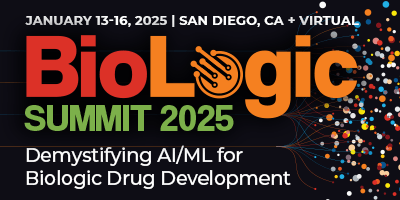インタラクティブブレイクアウトディスカッション
業界の専門家や同僚と、ML/AIを導入する際の進捗状況、傾向、課題について深く議論します。インタラクティブディスカッショングループは、潜在的な協力者とのネットワーキングに不可欠な役割を果たし、研究の例を共有し、グループでの問題解決に取り組む機会を提供します。
インタラクティブブレイクアウトディスカッションは対面でのみ行われます。
Machine Learning in Early Discovery
早期発見におけるML
火曜日 4:15 PM- 5:30 PM
TABLE 1: The Transition of Experimentalists into a Computational Paradigm in Pharmaceutical R&D
Moderator: Qing Chai, PhD, Executive Director, Eli Lilly & Company
- Addressing skills gaps
- Benchmarking progress compared with traditional structures
- Best practices for collaboration between experimentalists and data scientists
- Examples of successful transitions
- Implementing models/tools and workflows based on AI/ML approaches
Models for de novo Design
de novoデザインのモデル
火曜日 4:15 PM- 5:30 PM
TABLE 2: How Open Competitions Provide Valuable Benchmarking to Novel Technologies
Moderators: Andrew R.M. Bradbury, MD, PhD, CSO, Specifica, Inc., a Q2 Solutions Company
Matthieu Schapira, PhD, Principal Investigator, Structural Genomics Consortium, Professor, Pharmacology & Toxicology, University of Toronto
- Why benchmarking is needed
- Designed competitions, and accidental ones
- Lessons from CACHE
- The AIntibody competition to assess computational methods in antibody discovery
TABLE 3: The Use of Tools for Building Gene Editors for Going Beyond Proteins
Moderator: Jeffrey Ruffolo, PhD, Head of Protein Design, Profluent Bio
TABLE 4: AI-Driven Biologics: Accelerating Discovery, Overcoming Challenges
Moderator: Per Greisen, PhD, President, BioMap
- Motivation: The urgent need for novel biologics is driving the exploration of AI in drug discovery
- Focus: AI's potential in accelerating biologic drug discovery, particularly de novo antibody design
- Showcase: Successful AI-driven VHH and mAb designs
- Discussion: AI's strengths in predicting antibody structures, challenges in translating designs into functional molecules, achieving industrial-scale reliability, and closing the gap between computational and experimental results
Training Data Generation and Quality
トレーニングデータの生成と品質
1月16日木曜日 11:30 AM- 12:30 PM
TABLE 5: Internal Data Generation and Curation
Moderator: Kevin Metcalf, PhD, Senior Scientist, Merck
- Amplification strategies
- Avoiding bias
- Closed-loop experimentation
- Controls and validation
- Dealing with skewed data
- Historical data
TABLE 6: Machine Learning in Biologic Drug Discovery: Leveraging External Data Sources
Moderator: David Noble, Data Scientist, A-Alpha Bio
- Quantity: Availability challenges, scaling laws, synthetic data
- Quality: Diversity, leakage, reproducibility, quality vs. quantity
- Collaborative data generation: Industry-academia partnerships, data sharing consortia
- Federated learning: Technical challenges, open-source foundation models
- Intellectual property: Data ownership, balancing openness with commercial interests
- Open-source data: Curation quality, integrating diverse sources with proprietary data
Predicting Developability and Optimization Using Machine Learning
MLによる開発可能性の予測と最適化
1月15日水曜日 5:10 PM-6:00 PM
TABLE 7: Applying AI to Improve Manufacturability and Developability of Multispecific Biologics
Moderators: Mahiuddin Ahmed, PhD, President and CSO, VITRUVIAE
Jeffrey J. Gray, PhD, Professor & Research Mentor & Outreach Advisor, Chemical & Biomolecular Engineering, Johns Hopkins University
- Improving humanization and predicting immunogenicity
- Reducing off-target binding
- Predicting aggregation, viscosity, and excipient formulation
- Combining targets for improved efficacy
1月16日木曜日 11:30 AM- 12:30 PM
TABLE 8: AI/ML-Driven Design of Conditionally Active Molecules
Moderator: Hunter Elliott, PhD, Senior Director, Machine Learning, BigHat Biosciences
- What is the therapeutic potential of conditional activity and how do we best balance this against increased complexity and risk?
- What challenges are unique to ML-driven design of conditional molecules?
- How does the optimal ML toolkit vary between conditional and unconditional design?
- How best can we overcome challenges in data acquisition and availability?
- What are the currently tractable forms of conditional activity and what can we envision for the future?
TABLE 9: Practical Impacts of Machine Learning on Biologics Preclinical Pipeline
Moderator: Andrew B. Waight, PhD, Senior Director, Machine Learning, Discovery Biologics & Protein Sciences, Merck Research Labs
* 不測の事態により、事前の予告なしにプログラムが変更される場合があります。
アジェンダ・講演者・スポンサー更新










